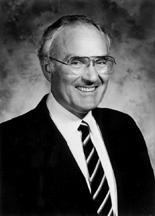Walter C. Bell
For his outstanding accomplishments in the U.S. Army and his leadership in two of the world's largest engineering construction firms, the Schools of Engineering are proud to present the Distinguished Engineering Alumnus Award to Walter C. Bell.
Senior Vice President and Manager, Americas Region
Bechtel Civil Company, Bechtel Corporation
MSCE 1960

On influential professors
There were three professors whom I still remember frequently because of their impact: Milton Harr, Bob Miles, and Charles Lovell.
Harr was a magnificent teacher with an extraordinary sense of humor. In one of his exams, he asked us to determine the superelevation of a highway curve-how much it should be tilted up to allow for the speed of vehicles. But instead of using the usual automobile, his problem used an elephant weighing so many tons running at a speed that was given in furlongs per fortnight. We were supposed to calculate the stress in the elephant's legs and how much the curve should be superelevated. It was an exact engineering problem, but Harr put in it the sense that this was not some nasty fearful thing to do, but we should have fun doing it.
Miles was also a solid teacher who brought a lot of everyday outside experience into engineering academia. He made me understand that engineering was also a practical business. Lovell was the ultimate academic professor, a tremendous teacher who made you realize this was a science.
On engineering, management, and people
When I was at Purdue I saw myself eventually as an engineer in the construction field. Instead I wound up in management. I always thought managers were the guys who ruined engineering!
A few years ago I talked to some undergraduates, and at the end of the talk, one of them asked, "What should we get a graduate degree in?" I answered that the real question is where do you want to be? They all said they wanted to be where I was. So I told them to get a degree in psychiatry or law, because in this business you get so involved in the contractual aspects and in managing people. I found the Army to be a great training ground for psychology, because you interface with so many people so often. I learned along the way, with a lot of scars and knocks.
On professional challenges
The biggest challenges I face are people issues-such as getting the right people in the right places, making them happy doing what they're doing. Getting the right team together and motivating it is what makes things happen.
My biggest concern today is the impact of what we do on the environments we work in. For example, we are managing the Boston artery project for the state of Massachusetts. It will reshape Boston over the next 15 years. It will have a tremendous social impact, economic impact, and visual impact. Civil engineering has more direct impact on society than some other engineering disciplines.
On engineering students and the global economy
Students need to be aware of what's going on internationally, particularly in the Pacific Rim but also in a lot of other second- and third-world areas. What has surprised me about many students is their focus on staying very near home. They don't understand the enormous opportunities to go into a totally new culture three or four thousand miles away. They are somewhat insulated from the sheer magnitude of what's going on.
For example, I got to Korea right after the war ended, 35 years ago. Seoul had a population living mostly in shanties. The tallest building was an eight-story-high Japanese building from the 1930s. There was no road system-we were just beginning to pave the first roads. Then I returned 25 years later and the city looked like it had been lifted right out of the United States. There were huge transit systems, boulevards, a forest of skyscrapers, and everybody living in very modern housing. It was a very dramatic change in 25 or 30 years. That's happening all over the world. That's the kind of thing we engineers do. I would advise students to stick their heads over the horizon, because there is a lot going on out there.
- 1993-present:
- Senior Vice President and Manager, Americas Region, Bechtel Civil Co., Bechtel Corp. Manages marketing and projects in North and South America, including aviation, high-speed rail, rapid transit, highways, bridges, ports, tunnels, buildings, urban development, water systems and treatment plants, and hydroelectric projects.
- 1993:
- Vice President and Manager, Americas Region, Bechtel Civil Co.
- 1992-1993:
- Manager of Transportation Business Line, Bechtel Civil Co.
- 1992:
- Manager of Surface Transportation Business Line, Bechtel Civil Co.
- 1990-1992:
- Deputy Manager of Surface Transportation Business Line, Bechtel Civil Co. Added responsibility for Bechtel's involvement in magnetic levitation projects, including California/Nevada Super Speed Train Project.
- 1989-1990:
- President and CEO, Morrison Int'l Inc. Directed international entity of the $2 billion multinational company.
- 1988-1989:
- President, Morrison Knudsen Engineers Inc. Responsible for all engineering and construction in transportation and water resource markets, with annual revenues of more than $65 million.
- 1987-1988:
- Senior Vice President.
- 1985-1987:
- Vice President, Program and Construction Management.
- 1985-1988:
- President, Morrison Knudsen Services Inc. Built backlog of $300 million of profitable work in two years.
- 1981-1985:
- Regional Vice President (North America), Morrison Knudsen Engineers Inc. Projects included Sacramento LTR Project, Baltimore Light Rail Project (design and construction management), and New Denver Airport (program management) .
- 1955-1981:
- Commissioned Officer, U.S. Army Corps of Engineers.
BSCE 1955, Polytechnic University of Brooklyn; MSCE 1960, Purdue.
